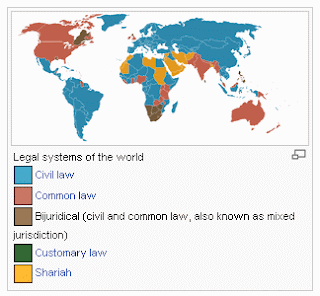Legal System in the World
 |
| Image Source: Wikipedia |
Each countries in the world apply each legal system one or more by combine each other. Anglo-Saxon legal system applicable in the Kingdom of the UK and commonwealth countries or countries affected by the UK, such as the United States and Canada (except Quebec Province), Malaysia, Australia, India, New Guinea, Ireland, New Zealand, South Africa, etc. Continental European legal systems applicable in European main continental and countries that affected by European mainland counties colonization/occupation (Almost 60% of the world's countries follow this system of law).
Legal communist system is used by communist country such as China and Rusia. Meanwhile, Islamic legal systems mostly used by middle east country and mixed applicable by other countries where people population dominated by moslem religion, such as Malaysia, Indonesia, Brunei Darussalam (especially for marriage and inheritance law). Civil law in Indonesia is based on civil law in the Netherlands, especially in civil law during the Dutch colonization in Indonesia. Please read also detail article on Differences of the Anglo Saxon with the European Continental Legal System.







